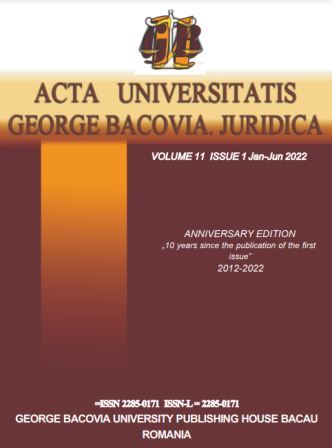Decizia de retrocedare a patrimoniului Brukenthal către Biserica Evanghelică, demers juridic care probează caracterul victimizant al dreptului românesc sau despre o abordare neconvențională a legislației criminale a României după lovitura de stat
The decision to return the Brukenthal patrimony to the Evangelical Church, a legal step that proves the victimizing character of the Romanian law or about an unconventional approach of the criminal legislation of Romania after the coup d'etat
Author(s): Valentin-Stelian BădescuSubject(s): Law, Constitution, Jurisprudence, Criminal Law, Human Rights and Humanitarian Law
Published by: Editura Universităţii George Bacovia din Bacău România
Keywords: romanian law; criminal law; Brukenthal; Saxons; illegal real estate foreclosures;
Summary/Abstract: We are defeated or LINEAGE defeated! What can you say about the unveiling of the statue of one of the Romanian oppressors, Baron Samuel von Brukenthal, whose statue, located in the Great Square of Sibiu, was unveiled on September 11, 2021 by President Klaus Iohannis. The statue is about 2.8-3 meters high and will stand on a baroque-style pedestal of about 60 centimeters. Samuel von Brukenthal was appointed head of the Court Chancellery. At the age of 52, he became head of the Chancellery of the Province, in the year of grace 1777, when Barca Brukenthal was appointed Governor of the Grand Principality of Transylvania as the working days of the Romanian Lands were increasing. In 1785, with a cruelty worthy of horror films, he allowed the shooting of Horia, Cloșca and Crișan on the wheel, then tied the motions to glie. Until the age of 66, he led the Transylvanian administration against the Romanians. After the death of her protector, Maria Theresa, her husband, Emperor Joseph II, withdrew her office. He knew what he knew. But Samuel von Brukenthal had already amassed a considerable fortune. How many Romanians still remember their beaten predecessors at the Pillar of Infamy, called Rudolf's Pillar? In the Grosser Ring, the Romanians who did not walk on Calea Vacii, that is, on the alley with glod (only the Saxons were allowed on the cobbled alleys), were subjected to torture ”. A plaque was inscribed on the statue of the great poet and politician Octavian Goga from Iași with the inscription: "Unfortunately, his political activity is unfortunate for the history of Romania because he was a fascist and anti-Semitic militant". Why not a similar intervention of the mayor of Sibiu? Or those in the localities in Romania where the Romanians' criminals raised busts. Because they dealt with illegal procedures for the restitution of emblematic objectives of national interest such as the Retezat Park and the Brukenthal Museum to the Evangelical Church. It is a museum that is part of the national heritage, subordinated to the Ministry of Culture, which has been returned to a private entity. The institution is still financed from the state budget (this is about employee salaries, investment in restoration and maintenance of buildings), but all revenues from exhibitions, events, payments made by visitors enter the pocket of the Evangelical Church. A formula for paving public money, located at the limit of the law.
Journal: Acta Universitatis George Bacovia. Juridica
- Issue Year: XI/2022
- Issue No: 1
- Page Range: 29-109
- Page Count: 81
- Language: English, Romanian

